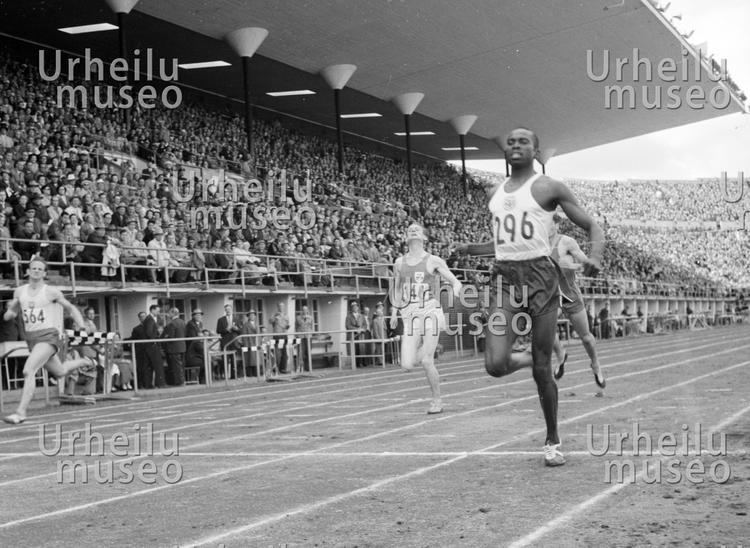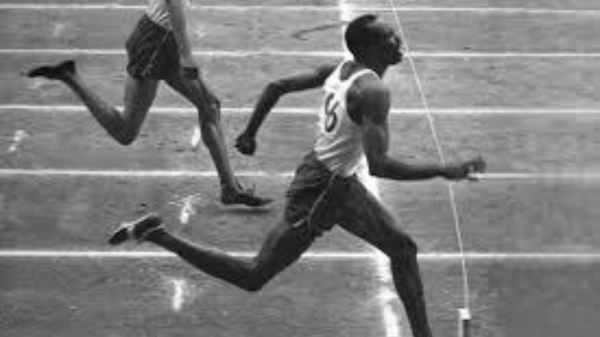George Rhoden, who was the second Jamaican to win a gold medal in track and field after Olympic gold medallist Arthur Wint (the Morgan State Bear who broke the 400-meter world record in 1950), was the final member of the Golden Quartet from the Helsinki Games (1952). He passed away on August 24 at the age of 97. It seemed like the world was ready for a legend to rise in 1948, but a very painful setback prevented the quarter-miler from winning gold at the London Games. And only four years later, in the most spectacular fashion imaginable, he—who had lived the majority of his life in the United States—got his atonement!
The four men who came into the London Games with the greatest chance of winning were Arthur Wint, Leslie Laing, Herb McKenley, and George Rhoden. After all, Wint had just finished an Olympic high-jumping 400-meter race in 46.2 seconds, matching the then-world record, and had won the 800-meter silver medal. With Wint’s muscular injury in the third leg of the race, the Jamaicans were eliminated, and Rhoden’s only hope of winning an Olympic gold was now slim to none. The same foursome reappeared in the following Games edition, or perhaps we should say, reappeared to claim what was rightfully theirs.
It seemed obvious that Jamaicans and Americans would triumph. These competitors breezed through the heats and semifinals. Americans briefly held a tiny advantage in the opening two legs of the finals. This time, Wint raced the first leg, but was just a little bit behind Ollie Matson in terms of time; at the halfway point, USA’s Gene Cole beat Laing by a significant 10m gap!
That day, McKenley put in a superb leg, finishing the lap in a mere 44.6 seconds, a whole 1.7 seconds quicker than Charles Moore. This gave the Jamaicans the advantage they needed, but if Rhoden hadn’t delivered, it would have been for naught. The race between him and Mal Whitfield was decided by the slimmest of margins.
How do you feel about it?
Whitfield, the sixth-place finisher in the 400-meter individual event, sprinted side by side with Rhoden, but Rhoden refused to give up. It came down to a mere 0.1 seconds, and the Jamaicans were declared not only the champions but also the ones who broke the record by an impressive 4.3 seconds!
“World Athletics is deeply saddened to hear that Jamaica’s George Rhoden, winner of the 400m and 4x400m at the 1952 Olympics, died on Saturday (24) at the age of 97,” the organization wrote in a tribute to Rhoden on its website.A number of sports fans celebrated the occasion on social media as well.
The trailblazer, who was born on December 13, 1926, started his professional career about 1940. At Kingston Technical High School, Rhoden was a student. The sprinter was defined by more than just their performance at the Olympics. He broke the 400-meter world record on August 22, 1950, at Eskilstuna, Sweden, with a time of 45.8 seconds. He was recruited by an American scout who spotted him competing in track meets at Sabina Park and Racecourse (National Heroes Park) and joined the Morgan State Bears track and field team from 1950 to 1952.
He won 200- and 400-meter crowns at the NCAA championships while competing for Morgan State. His name is associated with multiple AAU championship wins between 1949 and 1951. That 1954 CAC Games victory was his final significant triumph. There, he took home four medals: gold in the 4×100 and 4×400 meters, and silver in the 400 and 800 meters. All that being said, his influence extends beyond track and field.
Rhoden moved to San Francisco later in life, where he served as a mentor and educator. He has coached track and field and taught physical education at the University of the District of Columbia and Howard University. In addition, he was a member of the International Olympic Committee and the president of the Jamaican Amateur Athletic Association. George Rhoden moves on, leaving behind his friends, family, and a nation that has always been thankful and produced many greats like Usain Bolt, Shell-Ann Fraser-Pryce, and many more. Olympian Vilma Charlton, of Jamaica, is unaffected by his impact.
According to Charlton, the majority of Jamaican teenagers were once ignorant of the Rhoden’s status in the country’s track and field scene. He claims that people frequently believed that everything began in Beijing in 2008, the year that Usain Bolt’s incredible three gold medal performance at the Olympics (sprint double and 4 ×100 meters relay) was celebrated. That time, Shelly-Ann Fraser and Veronica Campbell-Brown also took home the victories in the 100 and 200 meters, respectively. However, only recently has the 70-year-old legacy that cleared this way come to light.
“I’m glad that the news anchors are introducing the ’48 and ’52 Olympics to the public before it’s time, so the younger generation can understand our perspective.” Because 2008 was such a great year, they believed that the Olympics had begun there, Charlton told Observer Online following Rhoden’s passing. He still has happy memories of the day Rhoden won the Olympics.
“I recall that Jamaica declared a national holiday in 1952 when they won. Though he marks the end of a chapter, children should understand where we started, according to Charlton. Social media responses demonstrated that his fans do, in fact, have positive memories of him.
Supporters recall a pioneer who elevated Jamaica in the world sprinting rankings.
The demise of George Rhoden has caused the Jamaican track and field community to reminisce, just as the country is going through a gradual transition following the Olympics in Paris. They loved the 1950s sprinters who had dominated the world of athletics. Wint, McKenley, and Laing—three more members of that formidable team—died in 1992, 2007 and 2021, respectively.
“RIP to Jamaica’s second Olympic gold medalist, former 400m world record holder, and member of Jamaica’s 4×4 world record,” a fan wrote as the final guard was removed, remembering the legacy.
It’s just as fascinating as the lines that revealed the feathers in George Rhoden’s crown. In the meantime, a spectator recalled Rhoden’s anchor leg from the Olympic 4×400-meter relay final in Helsinki.I’m grateful, George Rhoden. What a fantastic leg you’ve run. RIP.His triumph in the 400m helped him gain control of the world record. Up to his retirement, that regime remained in place. The highest authority overseeing the sport, the Jamaica Athletics Administrative Association (JAAA), acknowledged his legacy in a statement.
Garth Gayle, the president of JAAA, praised Rhoden as “a dependable team member.”Gayle referred to him as the “building blocks of our sport,” saying that his 1952 accomplishments “will always be remembered as they laid the groundwork for the strong track and field nation we are today.”Furthermore, one of his followers wrote, “The great George Rhoden.” May peace be upon his soul.Even at the highest level of the nation, there were responses.
Minister of Sport Olivia Grange stated, “There is no doubt that Vincent George Rhoden played his part in paving the way for future generations of Jamaican track athletes, who have certainly not let him down.” Wavell Hinds, the opposition spokesperson on sports, added her voice as well.
The influence George Rhoden had on Jamaican sportsmanship is immeasurable. Wavell Hinds, the opposition spokesperson on sports, said, “He was a trailblazer, achieving greatness at a time when opportunities for athletes from small nations like ours were limited.” Hinds urged the following generation to continue the heritage.
It was time to bid farewell to the Kingston, Jamaican sports icon with all those garlands and memories. The sentiment became more poignant, “RIP, steadfast. Warmest regards to his family.His life was an athlete’s tale, a track and field saga. That is how it will stay for the next few days.




